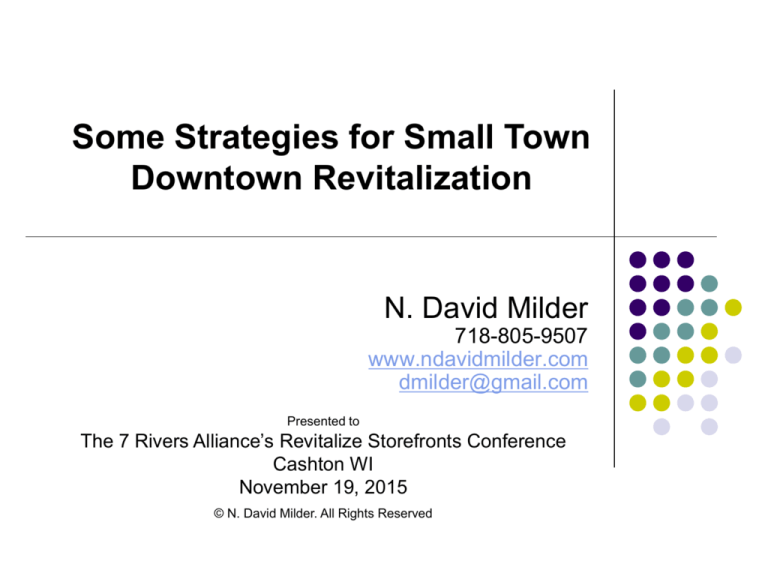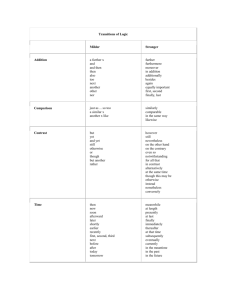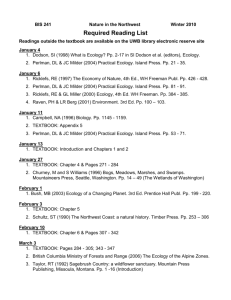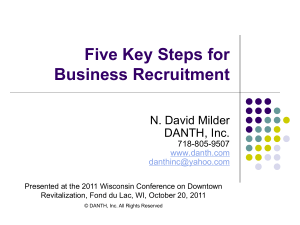
Some Strategies for Small Town
Downtown Revitalization
N. David Milder
718-805-9507
www.ndavidmilder.com
dmilder@gmail.com
Presented to
The 7 Rivers Alliance’s Revitalize Storefronts Conference
Cashton WI
November 19, 2015
© N. David Milder. All Rights Reserved
Strategies to be discussed:
1.
Developing and strengthening your
downtown’s Central Social District (CSD)
functions, especially the entertainment niche
2.
Attracting new residents who either do not
need jobs, will bring their jobs with them or
can create their own good jobs.
N. David Milder
2
In the New Normal for
Downtowns…
CENTRAL SOCIAL DISTRICT (CSD)
FUNCTIONS
ARE OFTEN BECOMING MORE
IMPORTANT
THAN CBD FUNCTIONS, e.g., retail
and offices
N. David Milder
3
Your CSD is…
The downtown area
with activity venues
that facilitate people
having enjoyable
experiences with
other people, usually
relatives and friends,
but, importantly,
sometimes strangers.
N. David Milder
4
Some CSD Components: (EN =
entertainment niche)
Movie theaters (EN)
PACs (EN)
Concert Halls(EN)
Museums (EN)
Art galleries (EN)
Arenas (EN)
Stadiums (EN)
Senior centers,
community centers (EN)
Pamper niche venues
(gyms, nail & hair salons)
N. David Milder
Restaurants and drinking
places (EN)
Parks/public spaces (EN)
Ice cream parlors; pizza,
hot dog, sausage joints
(EN)
Places of worship
Social clubs, (EN)
Catering halls (EN)
Public markets (EN)
Schools
5
An entertainment niche is a subset of
the CSD. Three of its components
should be given top priority:
Restaurants and drinking places
Parks and Public Spaces
Movie Theaters
N. David Milder
6
Restaurants and drinking places are
vital social amenities and they can make
it in small WI towns
N. David Milder
7
Here’s why…
N. David Milder
8
Here’s why 2…
Relatively low market share needs to be
won to be viable
Relatively low rent and labor costs
They now account for about 13% of the
annual sales in WI small downtowns – more
viable than most GAFO retail
We are now spending more on eating out
than on eating at home
N. David Milder
9
Biggest restaurant challenges in
small towns…
Small market area low revenue potentials
Low revenue potentials quality restaurant
operators and chefs probably will NOT be
attracted from the outside
High quality needed to draw customers from
a larger market area
Nationally, strong growth skilled kitchen
staff now harder to find
HOW CAN QUALITY BE IMPROVED?
N. David Milder
10
Parks and public spaces are often far
better strategic choices than formal
entertainment venues* because they
…
Are
usually much cheaper to build
Are much cheaper to operate and
maintain
Draw many more visitors
Have far fewer user frictions
*PACs, theaters, museums, arenas, stadiums, convention centers
N. David Milder
11
Some relevant data…
N. David Milder
12
Mitchell Park in Greenport, NY
– year round population 2,200
N. David Milder
Has a strong flow of tourists
in season (many shops
close in winter)
The park has an antique
carrousel, marina and
winter skating rink on a
waterfront location
Cost about $14.9 million to
build
Costs about $1 million/yr to
operate. Most of the costs
are covered by user fees
Reportedly gets about
390,000 visitors/yr
13
Division Street Plaza in Somerville,
NJ – population 12,100
N. David Milder
Basically a 1-block long
successful pedestrian mall.
Unusual because about
90% of them have failed
Cost about $675,000 to
create
Costs about $62,500/yr to
operate
Annually businesses are
attracting 116,000 to
128,000 patrons and events
are attracting about 100,00
visitors
14
Grand Central Plaza in Valparaiso, IN
– population 32,000
N. David Milder
Park with amphitheater,
ice rink and catering
facility
Cost about $3.25 million
to build Phase 1; $4
million for new addition
2014 operating costs
about $460,000/yr;
$100,000 by city;
$360,000 by Valparaiso
Events
Had about 130,000
visitors in 2014
15
The types of organizations that
made these projects happen…
Greenport’s Mitchell Park: the Village
government
Somerville’s Division Street Plaza: the Town
government, but mostly the BID
Valparaiso’s Grand Central Plaza: City
government and downtown biz group nonprofit
Local government action is essential –
those that provide for-a-fee business-like
services are more likely to succeed.
N. David Milder
16
How are they financed? In many
ways…
Greenport’s Mitchell Park: operations covered mostly
by user fees. Village spent about $4 million on its
development, rest came from 25+ grants and donations.
Somerville’s Division Street Plaza: the Town government
handles physical maintenance, the BID covers events,
marketing, sanitation. Initial construction covered by
Federal transportation program funds
Valparaiso’s Grand Central Plaza: City government
handles physical maintenance; sold naming rights
covers most of it. Downtown biz group applies user fees
and sponsorship funds to pay for events and marketing.
Private donations and TIF funds covered $4 million
expansion. TIF funds and state and Federal grants
covered most of Phase 1’s construction costs.
N. David Milder
17
Downtown movie theaters are
treasures, but under constant threat
A closed cinema is a terrible loss!
N. David Milder
They draw about 50,000
patrons/yr/screen
They are affordable
They are open
days/evenings/weekends
They have relatively few
user frictions
But, they provide a small part
of movie studio revenues
The marketing platform they
provide is what is keeping the
studios connected
Most movies are watched at
home – cinema attendance
down.
18
The challenge is to keep the cinemas
you have open, vibrant and profitable
New small town cinemas impossible to get!
Recently, in crossing the “digital divide,” many
communities devised viable strategies for
saving their theaters:
Crowdfunding
Community owned businesses
Creating opportunities for patrons to make a “night
a night of it” by tie-ins with nearby eateries and
improved public spaces
A viable rescue plan should be ready to go.
N. David Milder
19
THE JOBS PROBLEM
(Not Steve)
Focus More on Attracting and Supporting
People, Less on Big Firms With Putative Jobs
N. David Milder
20
Meta Strategy for Overcoming Small Town
Sparsely Populated and Resourced Market
Areas: Tap Denser & Richer Distant Areas
Tourism
2. Using the Internet
For More Customers
For Better Employment
Opportunities
For Education and Health Services
3. Attracting New Residents From Urban
and Suburban Areas
1.
N. David Milder
21
The Pivotal Economic Challenge
In our review of the literature, access to good
jobs was seen as the pivotal economic
problem of small and rural communities
Without good jobs, people will neither want
to stay in or move to these communities
The favorite strategic response seemed to be,
based on a cluster analysis, to try to recruit
outside firms that can bring in lots of jobs
This strategy, too often, has high costs, a low
ROI and will fail too many small towns.
N. David Milder
22
While most American adults do not
want to live in a rural area, a very
significant percentage do!
N. David Milder
23
Extrapolating from the Trulia
survey data…
About 61 million American adults prefer living
in rural areas
That’s greater than the entire population of
the UK or Italy
About 15.5 million American adults would like
to live in a rural area, but now don’t
That’s greater than the entire population of
Greece, Hungary or Sweden.
N. David Milder
24
Don’t count any age group out
The preference for living in the suburbs and
countryside over urban areas is strongest among
Baby Boomers (seniors) and Gen Xers. They also
have the most money!!!
But, even most Millennials now want to live in burbs
and small towns. Also, 26% see themselves as rural or
small town folks
Many urban Millennials can be expected to move as
the marry and have children – and as rural and small
town opportunities increase.
“Although there continues to be an outflow of young
people up to 34 years old, rural Wisconsin
experienced an increase of people 35-54 yrs old.”
N. David Milder
25
My attempt at a quick rural small town
residential locational assets and liabilities
assessment
Probable Assets
Lower housing costs
Neighborhood safety
Parks and recreation
opportunities
Probable Liabilities
It depends…
•
•
•
•
Proximity to workplace
Proximity to good jobs
Health care services
Quality of housing stock
Proximity to shopping and
entertainment
Education opportunities
Lower cost of living
Community character, ambience, attractiveness
Walkability
Broadband
N. David Milder
26
To penetrate this pro rural- small
town market segment, a town
needs…
Job opportunities – But, now in rural Wisconsin, job
opportunities are about 10% less than elsewhere; wages are
more than 25% less. (Rural Wisconsin Today 2013)
Attractive, affordable housing “Over one-quarter of all housing
units in rural Wisconsin were built since 1990, a slightly higher
percentage than Wisconsin as a whole and the United States.”
(RWT 2014)
Good quality of life amenities (schools, viable Main Streets,
attractive parks and public spaces, scenic views, low crime,
etc.)
Adequate health care services
An adequate broadband pipe (critical for job creation, health
care, education, entertainment).
N. David Milder
27
Health care services are especially
important for seniors
SCRMC Clinic in Frederic WI
N. David Milder
28
Some Data on Housing Cost
Advantages
According to a recent Urban Land article
Millennial owners paid on average for new
homes:
In newer suburbs: $356,604
In city downtowns: $337,232
The lowest average was $146,947 in rural
areas.
N. David Milder
29
One solution: Attract residents who
do not need jobs, e.g.,…
Seniors with ample retirement incomes
The 50+ age segment is 100 million strong, growing.
They control 70% of the nation’s disposable income.
Gering NE is attracting retired ranchers and farmers.
Many of its tourists are good residential prospects
Seymour NE has attracted retired former residents
Meredith NH is seeing second home owners turn into
full-time residents as they retire
Adequate healthcare services are critical
Second home owners
Feasible if big metro area is within a 2.5 to 3.0 hr
drive; creatives big potential market segment
N. David Milder
30
Senior Living in Gering NE
N. David Milder
31
Another solution: Attract new residents
who will bring their jobs with them
Many denizens of Kotkin’s “Valhallas” (Aspen, Jackson Hole)
Those in Central VT working in website design and services;
graphics services; managing investment funds; business
consulting with bosses/clients in other parts of the nation
Those with businesses and jobs that are “location free” and
rely heavily on electronic communications. For example:
A leather specialist who repairs well known handbags (e.g.,
Coach, Longchamps, Kate Spade, etc.) for web customers;
another web-based repairer focuses on Birkenstocks
A web retailer of reenactors clothing
Andrew Dane and I work on projects and co-author articles
though we live about 1,000 miles apart; my webmaster is
250 miles away; I have clients in CA, OR, AZ, NH, VT, WI
Needed: decent Internet pipe, UPS/Fedex, good highway.
N. David Milder
32
James Townsend & Son in
Pierceton, IN – 33 miles from
Ft Wayne
N. David Milder
33
Solution 3: Attract people who
will create their own jobs
Rebooting Seniors –
many seniors want new
careers to keep busy &
augment income
Freelancers/Contingent
Workers – always
recreating their jobs
Creatives looking for a
slower pace and more
rustic environment
(many are freelancers)
N. David Milder
Some will do hobby
related work in arts,
crafts, etc.
Some will open
restaurants, bars,
hotels, retail shops
Some will seek new
telecommuting based
work assignments
34
Four “creatives’ from Brooklyn
developed The Graham & Co. motel in
Upstate NY
N. David Milder
35
Why contingent/freelance workers
and the self-employed are critical
They are steadily growing in number nationally,
One GAO estimate (using a broad definition
consistent with the title of this slide) puts it at 40% of
the workforce in 2010.
In WI: “(F)rom 2000 to 2010, rural wage and salary
jobs decreased by over 22,000 (-2.6%). Conversely,
there was a significant jump in self-employment jobs,
well over 45,000 (+ 18.7%)….” (RWT 2013)
Can the “economic gardening” of the
contingents/freelancers/self-employed have more
impact than a cluster based business recruitment
effort?
N. David Milder
36
Better Use of the Internet
Early hopes that the Internet would make
more businesses “location free” -- and
better able to thrive in rural locations by
tapping urban markets and jobs – are far
from being fully realized
Many areas had no or poor broadband access
Too many small business people have not known how to
effectively use the Internet – changing as youths age
Powerful web-based job training, telepharmacy,
telemedicine, freelancer job marts (e.g., Freelancer,
Elance, Upwork, Flexjobs), fundraising programs were
either not developed or not quickly enough
This is changing, but the pace of change must increase.
N. David Milder
37
“creatives/knowledge
workers” problem?
There is a lot of malarkey about the value of young
creative hipsters and urban preferences of all creatives
Most creatives in NJ, for example, are “mature” and live
in the suburbs, not urban cities.
“The percentage of rural Wisconsin residents age 25
years and older with at least a bachelors’ degree has
almost tripled from 6.7 percent in 1970 to 18.7 percent
today.” (RWT 2014)
Rural towns with the needed assets can and do attract
creatives! For decades, we’ve seen many creatives in
numerous rural places in NY, NH, VT, MA
Beautiful scenery and attractive Main Streets/CSDs help
If they visit, they’re more likely to become residents.
N. David Milder
38
Addendum
The financial tool box available for small town
downtown revitalization has loads of tools
proven in small communities. See our article:
Milder, N. David, and Andrew Dane. “Some More
Thoughts on the Economic Revitalization of Small
Town Downtowns: Financial Tools.” Economic
Development Journal of Canada, November 2014.
http://tinyurl.com/qcbnefh
N. David Milder
39








